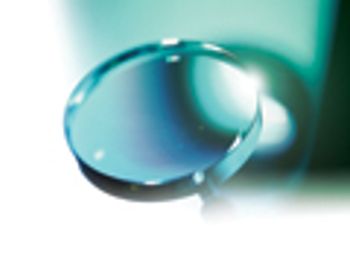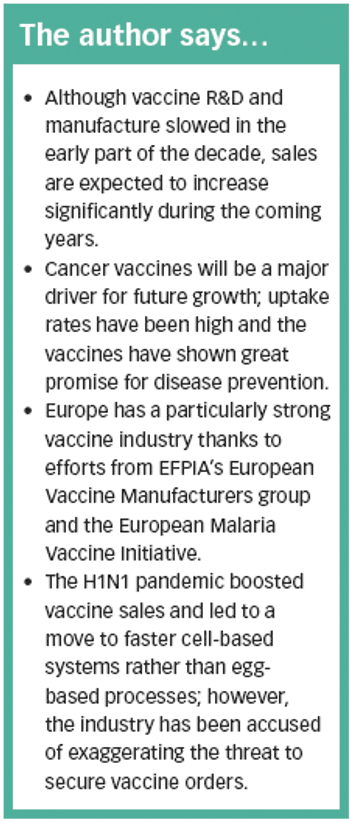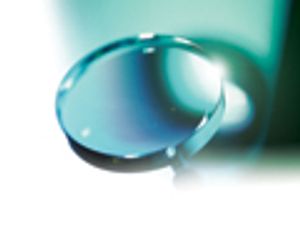
Orphan drugs for rare diseases are a major area of investment for pharmaceutical companies, but are they becoming too expensive for Europe to afford them?
Nathan Jessop is a columnist for Pharmaceutical Technology Europe.

Orphan drugs for rare diseases are a major area of investment for pharmaceutical companies, but are they becoming too expensive for Europe to afford them?

As the dreaded patent cliff continues to haunt the pharmaceutical industry, some companies are resorting to desperate measures to delay generic drug entry into the market.

Vaccine manufacturing was predicted in 2008 to be on the cusp of a golden era, but instead the industry has experienced cost pressures, high-profile liability cases and production setbacks.

EMA has been increasing its interactions with other regulatory agencies across the globe. The agency's most talked about collaboration is with FDA, but EMA has also been intently focused on bolstering its relationship with its counterparts in Japan, India and Russia.

Regulators in both the EU and the US have attempted to stimulate paediatric-drug development with incentives offering extended periods of patent protection, but are these actions having the desired effects?

Germany has shifted from a market where the pharmaceutical industry could enjoy considerable pricing freedom to a sensitive market influenced by cost-containment policies.

Parallel trade has frustrated pharmaceutical manufacturers for years and now evidence has linked such trade to drug shortages in Europe. Parallel trade representatives have yet to respond, but will need to react quickly to salvage their reputation.

The globalisation of clinical trials is putting pressure on the European Medicines Agency.

As the French Presidential campaign is underway, and politicians collaborate with businesses to revive a flagging economy, the pharmaceutical industry seizes the chance to lobby for equitable taxation to give the sector a much-needed boost.

Greece’s economic crisis has battered the country’s healthcare system, resulting in medicine shortages, market withdrawals and falling profits for the pharma industry.

Traditionally more prevalent in less industrialised regions, counterfeit medicines are now more frequently entering the heavily regulated supply chains of EU countries.

The scandal surrounding Servier's diabetes drug, Mediator, continues to unravel in France and could have implications for the whole pharmaceutical industry as the country scrutinises its regulatory systems.

The next two years may see a shake up in the world's current top pharmaceutical companies, with Pfizer likely to be the only US firm to remain in the top five by sales.

Despite the fact that Europe's population is ageing rapidly, the region is astonishingly still underprepared for dealing with the health-related effect of this demographic trend.

With the cardiovascular disease burden in Europe increasing, policymakers, regulators and other healthcare stakeholders are seeking to raise awareness and lessen the threat.

Electronic prescribing has grown strongly in the US but its future as a European-wide approach in healthcare has been uncertain; new regulatory interest could change the playing field.

The rising cost of healthcare has complicated the introduction of new, innovative drugs and other medical technologies. While the medical impact of these healthcare advances cannot be denied, governments and healthcare policy makers have found it difficult to sustain the funding of these expensive treatments.

Croatia is on track to join the EU in 2013 and offers a well-developed pharmaceutical market. However, its EU membership application has undergone much scrutiny.

Switzerland is an important power in Europe's pharmaceutical industry.

Despite initiatives to encourage multinational pharma companies to conduct R&D in the UK, the country may be losing its edge; is Pfizer's decision to exit a key site earlier this year the beginning of a mass exodus?

Europe's approach to pharmacovigilance has room for improvement that European agencies are working on.

In France, public confidence in health authorities and pharmaceutical industry has been shaken by a safety scandal over the drug Mediator (benfluorex hydrochloride).

The recent India–EU summit was expected to bring news about the upcoming Free Trade Agreement between the EU and India; however, a dispute regarding the supply of generic drugs from India to developing countries has taken centre stage.

Direct-to-consumer (DTC) advertising is firmly entrenched in the US, but has historically been considered as an inappropriate means of communication in Europe for prescription-only medicines.

A European-wide awareness initiative hopes to tackle the issue of antibiotic over-prescription, but industry must also be encouraged to make further investments.

There has been increasing cooperation between the EMA and the FDA in recent years, and this looks set to continue in the future.

The early part of the decade saw a decline in vaccine sales and manufacture, but finally the industry is bouncing back, with Europe particularly well placed to make an impact.

Despite the poor economic climate, large-scale mergers and acquisitions in the pharmaceutical industry struck back with a vengeance in 2009.

Published: August 1st 2013 | Updated:

Published: July 1st 2013 | Updated:

Published: January 1st 2013 | Updated:

Published: October 1st 2012 | Updated:

Published: September 1st 2012 | Updated:

Published: August 1st 2012 | Updated: